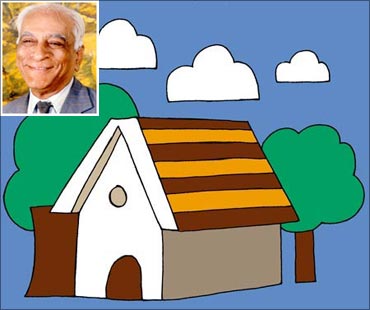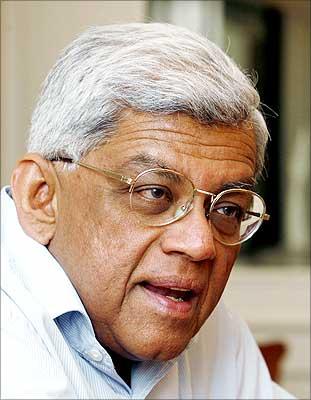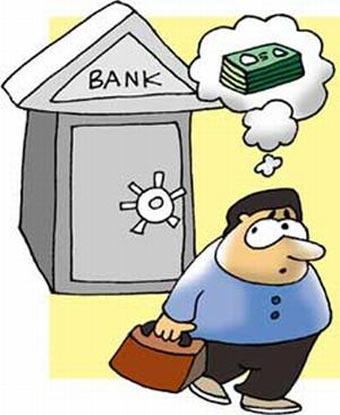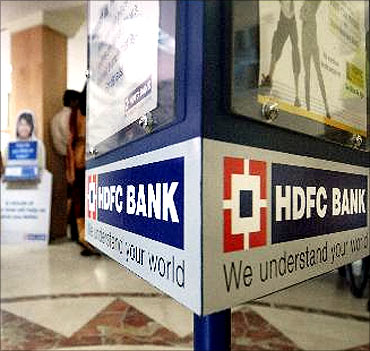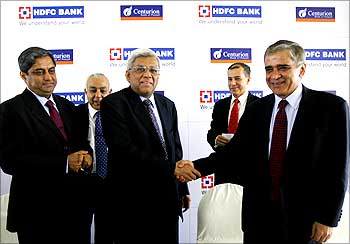 | « Back to article | Print this article |
H T Parekh: The man who made home loans possible in India
Younger readers of business papers might have barely paid attention to the full page notice by HDFC to honour its founder last week.
The bright-eyed smiling man, whose picture was at the centre of that page, is virtually unknown to people now in their 20s or 30s.
Those who work in or around Churchgate in Mumbai may have made the connection between the photo of H T Parekh and the street named after him in that area.
It is ironic that in a time when even moderate business success leads to people being lionized in the media -- a visionary of the pre-liberalization era has almost been forgotten.
Click NEXT to read on . . .
H T Parekh: The man who made home loans possible in India
It is a reflection on both the quality of intellectual life of Mumbai's business world and on those who inherited Parekh's legacy that almost two decades after he died there has been no biography of the man, nor a memorial lecture nor an academic chair instituted in his name.
Perhaps the centenary year of his birth might serve as an impetus to make amends.
On March 10, 2011, H T Parekh, or HTP as he was often called, would have been a hundred years old. Why does the birth centenary of HTP call for our attention? Why are this man's life and strivings relevant to the present?
First and foremost, because -- as he often said -- while he spent his entire working life in service of Lakshmi, the goddess of wealth, he felt more devoted to Saraswati, goddess of learning and wisdom. This was evident in the simple life-style he lived as well as in his engagement with ideas and values.
Click NEXT to read on . . .
H T Parekh: The man who made home loans possible in India
Secondly, he acted on the conviction that the stock market could be a powerful tool for economic democracy.
Thus, HTP founded the Housing Development and Finance Corporation (HDFC), back in 1977, and for the first time made it possible for salary-earning, middle-class Indians to become home owners long before retirement.
And he did this a decade-and-a-half before liberalization.
As Dr Nita Mukherjee, the editor of a two-volume publication of selections from HTP's writings, said last week: "Every newly employed person who walks away with a home loan sanction today in 24 hours ought to say a prayer of gratitude to HTP. That's because he proved that successful mortgage finance was possible."
He made a paradigm-shifting contribution at a time when Indian banks could not give loans for housing, either to an individual or to a builder because housing was not deemed to be an 'industry'.
Click NEXT to read on . . .
H T Parekh: The man who made home loans possible in India
HTP belonged to that charmed generation of highly qualified young people who were in the prime of life when India gained Independence.
A graduate of Wilson College, Mumbai and London School of Economics, HTP started out as a stock broker at Harkisondass Lukhmidass.
In 1953 he joined the Industrial Credit and Investment Corporation of India, now better known as ICICI, as a deputy general manager. He rose to become managing director and executive chairman of ICICI.
While he acknowledged the spirit of 'bazaar' banking imbibed from his father HTP said that the much deeper influences in his life were his mother "the stamp of her self-effacing character" and Gandhiji's values and philosophy.
Click NEXT to read on . . .
H T Parekh: The man who made home loans possible in India
Setting up HDFC in 1977 was a post-retirement undertaking. It was the realization of a dream he had nurtured since the early 1950s -- when he first drafted a proposal for a housing loans company that would serve the middle class.
The idea of lending against future incomes was, at that time, quite revolutionary -- since six-digit monthly salaries were virtually unknown.
HTP set up a first-world level service for home loans at a time when Indians waited for years before getting a telephone or gas connection -- or even a Bajaj scooter or Fiat car.
As early as 1960, HTP made a case for introducing mutual funds in India. It bothered him that 13 years after Independence India had only 5 lakh (500,000) investors in the capital markets.
Click NEXT to read on . . .
H T Parekh: The man who made home loans possible in India
"It has to be realized" wrote HTP, "that mere creation of institutional agencies does not expand a country's capital market. The real backbone of the market is the individual investor."
It is unlikely that when he wrote these lines in 1960 HTP could have visualised today's net-savvy individual day trader making speculative forays into the stock market.
For him the stock market was not a source of either cheap funds for industry or get-rich-quick gambles for individual traders.
"He viewed it more as a way of economic democracy-so that the ordinary Indians' savings could be gainfully employed in industrialisation and they could benefit from the gains of entrepreneurship" wrote Mukherjee in a tribute last week.
Click NEXT to read on . . .
H T Parekh: The man who made home loans possible in India
In the wake of the Harshad Mehta scam in 1993, HTP was disturbed but as a passionate optimist his attention was more closely focused on the fact that an increasing number of Indians who were entering the stock market -- which he saw as a form of empowerment.
By then HTP was fully retired and his health was often uncertain. But his mind remained razor sharp and his dreams were focused on a still higher aspiration -- South East Asian unity.
As early as 1962 when even the idea of a European common market was in its infancy HTP began asking "why not an Asian Common Market?" Jean Monet, the man credited with building a unified Europe after World War II, remained one of his life-long heroes.
Even a fully functional SAARC, HTP wrote, cannot be the work of governments alone. It must be a 'movement' based on the strivings of people in all the neighbouring countries. Business, he knew, has a special role to play in this process.
Click NEXT to read on . . .
H T Parekh: The man who made home loans possible in India
Time has vindicated HTP's dreams on the housing front. There are now promising young entrepreneurs working on housing finance for low income groups.
Various initiatives have recently been launched to create business-models for low-cost, high-quality construction.
But the essence of why this man's legacy is most acutely relevant might be a sad reflection on our times.
For him all enterprise had to directly serve a social purpose. But today there is need for 'social enterprise' -- which though admired remains a phenomenon on the fringes of 'mainstream' business.
